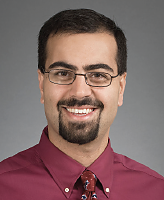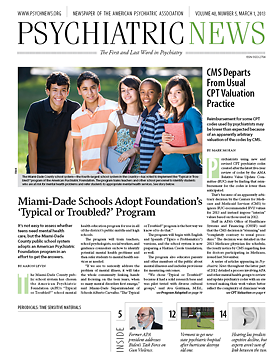My past few columns have talked about career development—the difficult task of identifying mentors and allies who can help you define yourself as a psychiatrist. Residency is a developmental process, just like every other stage of formal training, and even as we learn to be skilled clinicians, we are constantly deciding what kind of psychiatrist we will be. Private practitioner? Salaried clinician? Researcher? Community leader? Administrator? Ordinary “working doc”?
Given the need for mental health services nationwide, each of us can choose any of those roles, and often more than one. But how do you decide? And once you decide, how do you implement that decision? For some decisions, your training director and local faculty may not know how to advance your career. Even if they have advice, they certainly cannot capture the whole national picture.
When your local resources don’t fully meet your needs, your best option is traveling—specifically, to the APA annual meeting each spring.
If you have not been to an annual meeting during your training, now is the time to plan for this year’s meeting in San Francisco May 18 to 22. Aside from scientific updates (especially on the new DSM-5) and a very fun city, the meeting is packed with mentoring events specifically for trainees. I will highlight a few of them, both to encourage you to register and because space can fill up fast!
As with most of life, the best opportunities go to the early risers. On Monday, there is a “Meet the Experts” breakfast, where we convene leaders and master educators from every psychiatric subspecialty to answer questions, opine about the future, and teach about career options. With up to 20 topics covered in any given year, you’ll surely find something of interest, and the connections you make can be invaluable for years to come.
That’s followed on Tuesday by further networking breakfasts for women and early-career psychiatrists. All are worth the reduced sleep—from last year’s research breakfast, I walked away with two department-chair contacts and a new overview of strategic directions in neuroscience. The National Minority Network Mentor Breakfast precedes “Meet the Experts” on Sunday. Or, if you aren’t in a specific mentoring breakfast category, you might benefit from a new initiative planned this year by Dr. Erik Vanderlip, our member-in-training trustee-elect.
Throughout the meeting, most programming for residents and fellows will be in a single room, the MIT Center. When there isn’t a lecture or workshop there, the room will still be open and available as much as possible. We are working to invite representatives from several allied organizations to schedule some time when they’ll be at the MIT Center to answer your questions. Come by, meet psychiatry’s leaders, and let us help you network!
The other key meeting strategy is to save some energy and keep your early evenings free. Some of the best networking and mentoring opportunities happen right after the scientific sessions end for the day, particularly if you are interested in administration or leadership. On Sunday, we will host a meeting of the Caucus of Members-in-Training, where Erik, other MIT leaders, and I will give an update on APA’s activities and how to find a leadership niche for yourself; just like last year, we will have light refreshments, generously sponsored by local residency programs.
On Monday, the American Psychiatric Foundation will host a wonderful gala, attended by APA’s top leadership, with deeply discounted tickets for residents. The food and drinks alone are worth the ticket price; the chance to establish a relationship with psychiatry’s giants makes this a can’t-miss event.
Finally, if your interest is in national legislation, APA’s political action committee, APAPAC, will host nightly receptions, usually including a Residents’ Night. Staff and APA members experienced in influencing legislation will be there and are excellent resources if you’re interested in how the law affects mental health.
Attending an APA annual meeting is a big investment for a resident. However, that’s exactly what it is: an investment in your future. This is the only event where you can explore multiple career interests, make so many vital connections in one place, and have a good time doing it! And, when you do come to the San Francisco meeting, please feel free to ask me for introductions to Board members or other leaders—helping mentor the next generation of psychiatry’s leaders is one of the best parts of being an APA trustee. ■

